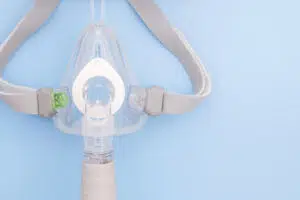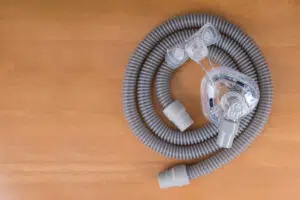CPAP and Bi-PAP Cancer Lawsuit
 What Are CPAP, Bi-PAP, and ASV Devices Used For?
What Are CPAP, Bi-PAP, and ASV Devices Used For?
Mechanical devices such as CPAPs, Bi-PAPs, and ASVs are commonly used to assist patients with respiratory issues, whether due to sleep apnea, or a breathing condition, or undergoing a medical operation. These mechanical devices have been shown to be effective at reducing the number of times that an individual has to wake up during the night for airway clearance which can lead to improved quality of life and reduced risk of complications from obstructive sleep apnea syndrome or other respiratory conditions.
A mechanical ventilator device can be used to support a patient by:
- Supplying a high concentration of oxygen to the lungs, such as for people with sleep apnea.
- Cleansing the body of carbon dioxide.
- Assisting the patient in breathing so they can recover from an injury or illness.
- Replacing their breathing when they are incapacitated, unconscious, or undergoing respiratory failure.
The most common use of these devices is to help people with obstructive sleep apnea syndrome breathe more easily while they sleep. The medical device helps keep the throat open so that the person can take deeper breaths without waking up and allows them to get enough restful sleep.
The types of devices used to treat breathing and respiratory conditions include:
- CPAP (or "continuous positive airway pressure) machine: A CPAP machine delivers pressurized air to help keep the person's airway open while sleeping so that it doesn't close off or collapse completely. CPAP is the most commonly prescribed PAP device, the most effective, and the most affordable.
- Bi-PAP, Bi-Level PAP, or BiLevel PAP (or "bi-level positive airway pressure") machine: A Bi-PAP machine is a type of sleep therapy tool that uses higher inspiratory pressure (IPAP) and lower inspiratory pressure (EPAP) to keep the patient's airways open when breathing.
- ASV (or "adaptive-servo ventilation") machine: An ASV machine is a Bi-PAP device with newer technology. It is used for sleep disorders and provides positive expiratory airway pressure (EPAP) and inspiratory pressure support (IPAP) to help the person breathe and is able to adjust the airflow based on the person's breathing patterns. Because of the contraindications associated with this device, it is not for everyone and a medical expert should advise whether it's the best form of treatment.
Many people find relief from breathing devices such as CPAPs, Bi-PAPs, and ASVs. However, millions of these devices have been recently recalled after researchers discovered the potential link to long term illness and several types of cancer.
Can a CPAP, Bi-PAP, or ASV Machine Cause Health Problems?
Research has shown that mechanical ventilators and breathing machines can cause health problems. If you have breathing issues or have been diagnosed with sleep apnea and use a CPAP, BiLevel PAP, or ASV machine to treat your condition, it is important to be aware of its potential adverse effects:
- Dry mouth: This side effect can be very uncomfortable for some people. Dry mouth happens when a person becomes used to breathing through a tube that goes into your nose or throat.
- Nosebleeds: Some patients experience nosebleeds when they first start wearing the mask. When using a CPAP machine, the air pressure increases, causing blood vessels to burst and resulting in nosebleeds.
- Throat irritation: Many users complain about sore throats caused by the constant flow of humidified air coming from the CPAP machine.
- Eye infections: One of the most serious problems associated with CPAP therapy is an eye infection. People who wear masks all night tend to develop red eyes due to the moist environment created by the device.
- Skin rashes: A lot of people report developing small bumps under their noses and cheeks.
- Headaches: Some people experience headaches because of the pressure associated with wearing a CPAP mask.
- Sore throat: Experts suggest that this problem might occur due to the fact that the nasal passages become irritated by the moisture produced by the device.
- Dizziness: One of the most serious complications associated with CPAP usage is dizziness. Because the airflow through the nostrils creates an artificial environment inside the body, it can affect a person's balance and equilibrium.
Other side effects that have been reported included an increase in anxiety and claustrophobia. Some patients reported feeling anxious when using the device at night because they worry about falling asleep without it. Others expressed feelings of claustrophobia as a result of being exposed to the noise from the machine throughout the night.
Furthermore, a study conducted by Johns Hopkins Medicine showed that patients who used CPAP sleep apnea machines for five years or longer experienced significantly increased levels of inflammation in their bodies than did other participants. Inflammation plays a role in many diseases, including cardiovascular disease, type 2 diabetes, Alzheimer’s disease, arthritis, multiple sclerosis, Parkinson’s disease, rheumatoid arthritis, lupus, and others.
Can a CPAP Machine Cause Cancer?
It is possible that your CPAP machine may be linked to certain types of cancer. Researchers recently discovered that the sound-abating polyurethane foam ("PE-PUR Foam") inside many Philips CPAP devices might be inhaled or absorbed once dissolved, releasing black debris of potentially hazardous substances. The foam breaking down causes carcinogens to be released ultimately linked to different types of cancers.
According to these researchers, these substances are toxic and the harmful chemical emissions can be linked to various types of cancer, including:
- Leukemia
- Kidney cancer
- Melanoma
- Bladder cancer
- Lymphatic cancer
- Nasal cancer
- Prostate cancer
- Breast cancer
- Lung cancer
- Pancreatic cancer
- Uterine cancer
- Thyroid cancer
- Stomach cancer
- Brain cancer
- Testicular cancer
- Liver cancer
- Hematopoietic cancer
The FDA has not yet approved any products containing polyester-based polyurethane foam as part of their design. However, according to the American Lung Association, there have been more than 1 million cases of lung injury related to the use of CPAP devices since 2001. In addition, the ALA says that over 100 deaths were reported between 2000-2005 alone.
It is important to provide more context on the cancer risks associated with polyurethane foam. Studies have determined that, when dissolved, this chemical can emit the following off-gases as it dissolves or breaks down, which can be inhaled by CPAP users:
- Formaldehyde: Labeled as a human carcinogen that may cause leukemia. Exposure can cause respiratory illness, eczema, or death.
- Benzene: When inhaled, it can affect a person's nervous system, immune system, and increased chance of infection.
- Methylene chloride: Has carcinogenic effects that can damage a person's eyes, skin, liver, and heart. Exposure can cause drowsiness, dizziness, numbness and tingling limbs, and nausea. Severe exposure can cause loss of consciousness or death.
- VOCs (volatile organic compounds): VOCs as a human carcinogen that can cause damage to the eyes, nose, and throat as well as headaches, nausea, dizziness, and fatigue. It can also cause kidney and liver damage and impact the nervous system.
- PFOS (perfluorooctanesulfonate): Potential human carcinogen that can affect the liver, thyroids, kidneys, as well as impact the neurological, skeletal, and cardiovascular systems.
- Solvents: Can harm the eyes, lungs, and skin. Solvents can cause headaches, nausea, dizziness and impair a person's judgment.
- Flame retardant: A carcinogenic that can cause damage to a person's neurological and hormonal systems.
Additionally, research indicates that the polyurethane foam degradation happens more rapidly in CPAP machines. This is due to the high humidity associated with using the breathing device as well as insufficient and unapproved cleaning methods by users, such as ultraviolet or ozone cleaning tools.
Does the Philips Sleep Apnea Machine Cause Cancer?
It is possible that the Philips sleep apnea device may increase the risk of cancer. Through company notices to the public and an eventual recall, the company has signaled its awareness of the potential danger to its customers.
The Philips alarm was first sounded in April 2021, when the company issued a health notice to its customers regarding their Philips CPAP, Bi-PAP, and AVS devices that were manufactured between April 11, 2007 and April 22, 2021 and distributed between July 21, 2009 and April 22, 2021. In this notice, they address the potential health risks associated with their products.
Later, in June 2021, the company followed up with a voluntary recall of approximately 20 of its breathing devices because of the harmful risks that are linked to its polyurethane foam. On July 23, 2021, the Food and Drug Administration classified the Philips device recall as "Class 1," which is the most severe of their classifications. A Class 1 recall considers that "there is a reasonable probability that the use of or exposure to a violative product will cause serious adverse health consequences or death" and results in removing the product from the market. According to the FDA, there have been over 1,200 complaints and 100 injuries reported for the issues associated with Philips devices.
This recall included an estimated 2 to 3 million devices, with approximately two-thirds of these machines in the United States. Philips recommends that patients stop using the recalled units and contact their healthcare provider to determine the next steps in their treatment.
What CPAP, Bi-PAP, and AVS Machines Have Been Recalled?
If you have used, or are currently using, a Philips CPAP, Bi-PAP, or AVS device, it is vital that you determine whether your product has been recalled.
According to the FDA, the following Philips CPAP machines and life-sustaining ventilators have been recalled due to the health risks associated with their polyurethane sound-abatement foam:
- E30 (Emergency Use Authorization)
- DreamStation ASV
- DreamStation ST, AVAPS
- SystemOne ASV4
- C Series ASV, S/T, AVAPS
- OmniLab Advanced Plus In-Lab Titration Device
- SystemOne (Q series)
- DreamStation CPAP, Auto CPAP, BiPAP
- DreamStation GO CPAP, APAP
- Dorma 400, 500 CPAP
- REMStar SE Auto CPAP
- Trilogy 100 Ventilator
- Trilogy 200 Ventilator
- Garbin Plus, Aeris, LifeVent Ventilator
- A-Series BiPAP V30 Auto Ventilator
With regards to ResMed machines, these devices are not impacted by the recent Philips recall. According to ResMed's CEO in June 2021, "ResMed devices are safe to use and are not subject to Philips’ recall. ResMed devices use a different material than what Philips uses in their recalled machines. Patient safety is always our ResMed team’s top priority."
Are All CPAP Machines Being Recalled?
As of the date of this publication, the Food and Drug Administration does not have additional information to indicate that any other CPAP, Bi-PAP, or AVS machines from Philips or other manufacturers are dangerous to consumers and subject to recalls. However, if you own a CPAP machine or ventilator, it is important to continue to check both the FDA's website as well as information, news, and updates from your device manufacturer.
What Do I Do if My CPAP Device Has Been Recalled?
If your Philips CPAP device is listed on the recall list, consult with your doctor or healthcare provider immediately. As it pertains to your breathing treatment, he or she may recommend that you stop using your device, recommend a replacement device, or prescribe alternative therapy for your illness. Your physician will also be able to recommend additional tests to determine whether or not your Philips CPAP machine may be contributing to your health issues. They will also be able to update you on the latest guidance from the Food and Drug Administration. Additionally, if you notice any concerning health symptoms, or if your CPAP machine is listed on the recall notification list, contact an attorney to learn more about your rights.
What Do I Do if I Have Been Diagnosed with Cancer After Using a CPAP, Bi-PAP, or AVS Machine?
If you have been diagnosed with a medical illness or cancer as a result of your Philips CPAP machine, it is important to preserve any evidence pertaining to your device and illness(es). It is important to keep all of your records, including medical bills and records, prescription records, physician and doctor reports, as well as the machine itself.
Finally, it is important to be aware that defective medical devices and injuries associated with their products can be complex. If you are experiencing any of the illnesses listed above and have used a recalled Philips CPAP device, you may be entitled to receive monetary compensation for your injury. It is important that you contact an experienced products liability attorney regarding your case. Call our attorneys at The Rothenberg Law Firm for a free consultation.



